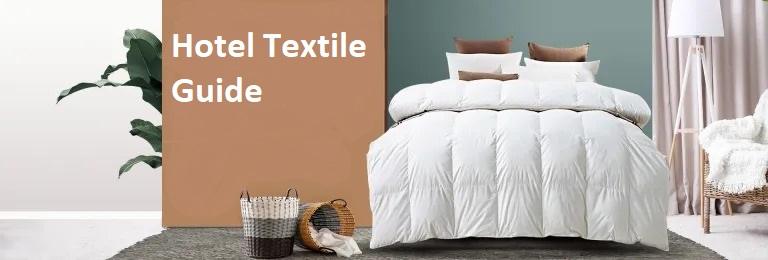For hotel managers, understanding the various textile products and the key quality standards is essential to making informed procurement decisions. In this blog, we’ll explore the ultimate hotel textile guide, quality benchmarks to look out for, and the role of innovative manufacturing processes such as Air Jet Looms. Additionally, we’ll take a closer look at Acme Mills, a leading textile exporter known for producing premium hotel textiles.
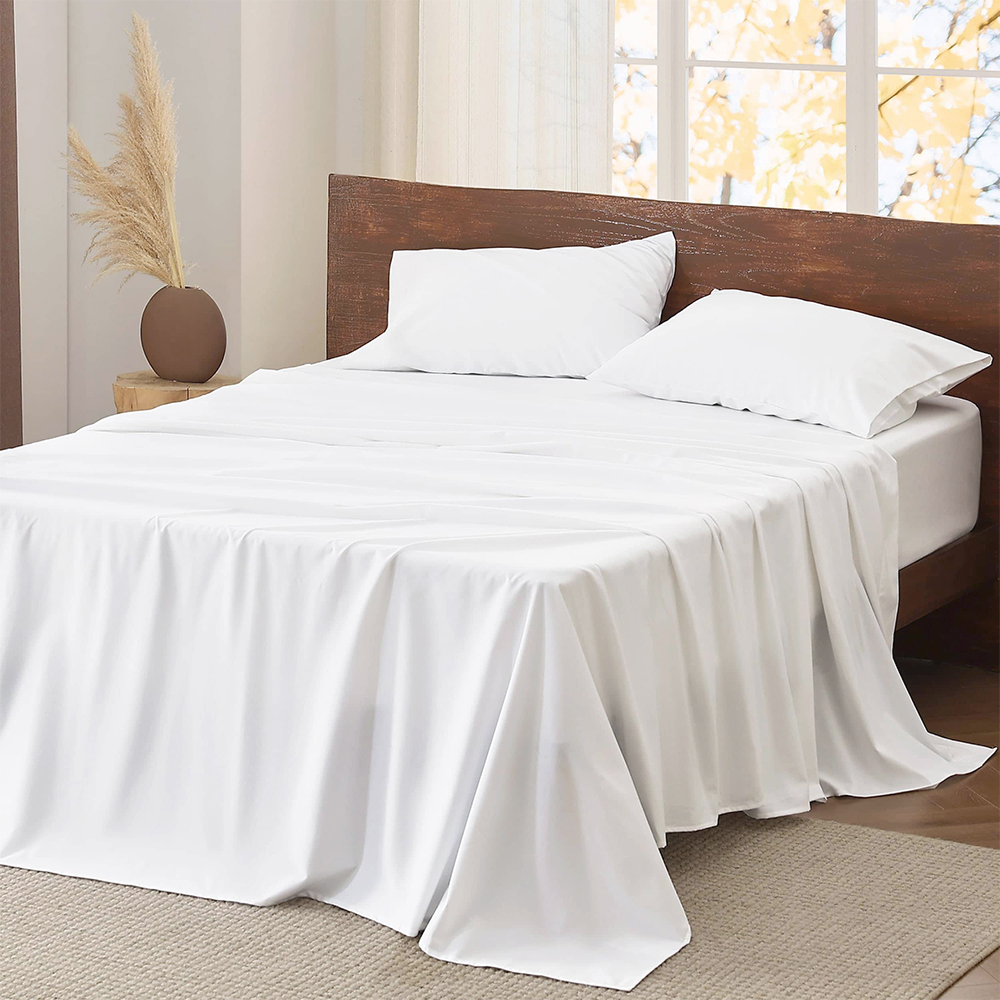
In the hospitality industry, the quality of hotel textiles plays a crucial role in shaping the guest experience. From the bed linens that envelop your guests to the towels that provide them comfort after a shower, every textile item used in a hotel needs to meet high standards of quality. These textiles not only enhance the aesthetic appeal of the property but also play a pivotal role in operational efficiency, guest satisfaction, and brand identity.
The Importance of Hotel Textiles
Hotel textiles are not just functional items—they directly affect the comfort, cleanliness, and overall satisfaction of the guest. High-quality textiles contribute to a positive experience, which can have a direct impact on guest reviews, repeat business, and the reputation of the property. The types of textiles typically found in a hotel include:
- Bed linens (sheets, pillowcases, duvet covers)
- Towels (bath, hand, washcloths)
- Bathrobes and slippers
- Pool towels
Each of these textile products must balance durability, comfort, and aesthetic appeal. For example, a luxury hotel may prioritize soft, high-thread-count sheets and plush towels, while a budget hotel may focus on durable, cost-effective textiles that still offer a clean and comfortable experience.
Quality Standards for Hotel Textiles
The quality of hotel textiles is a direct reflection of a hotel’s commitment to guest satisfaction. As a hospitality manager, it’s important to understand the key factors that determine the quality of textiles, as well as the performance standards required for each product.
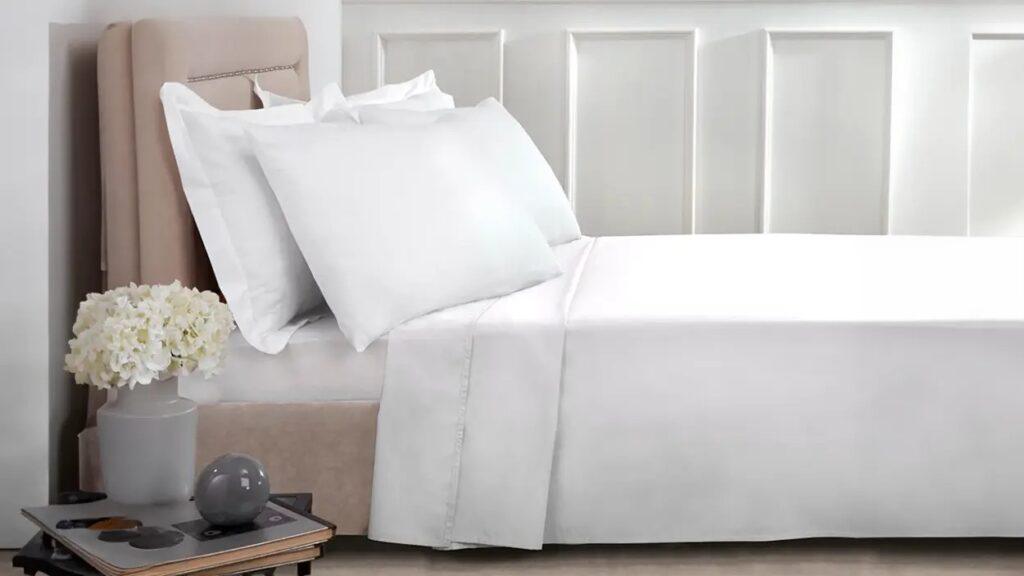
a) Thread Count and Fabric Quality
Thread count refers to the number of horizontal and vertical threads woven into one square inch of fabric. A higher thread count typically indicates a smoother, softer fabric. However, thread count is just one factor in determining the quality of bedding. The type of cotton used, such as Egyptian or Pima cotton, as well as the weave pattern and fabric finish, all contribute to the overall feel and durability.
- Luxury hotels: Bed linens typically have a thread count of 300–800, often made from fine cotton like Egyptian cotton, known for its softness and strength.
- Mid-range hotels: Bed linens in the range of 180–300 thread count are commonly used, with cotton blends providing a balance between comfort and cost-efficiency.
b) Durability and Performance
Textiles used in hotels face high-frequency washing and heavy usage, which requires durability and longevity. Fabrics such as polyester blends, cotton-polyester mixes, and other synthetic fibers are designed to withstand frequent laundering without losing their shape or softness.
c) Absorbency
Towels, bathrobes, and other fabrics in bathrooms must offer high absorbency to ensure comfort and functionality. Towels with a GSM (grams per square meter) rating of 400-700 are ideal for maintaining softness and absorbency, with luxury hotels often choosing towels with a higher GSM.
d) Color Fastness and Stain Resistance
Hotel textiles should be able to retain their color even after frequent washing, ensuring that the fabric stays fresh and appealing. Many textiles are treated with stain-resistant finishes to help maintain their appearance over time, making them easier to care for and longerlasting.
e) Eco-Friendly and Sustainable Options
As sustainability becomes more important to both consumers and businesses, it’s crucial to select textiles that are made with eco-friendly materials and manufacturing processes. Certifications like OEKO-TEX® guarantee that the textiles are free from harmful chemicals and are made from sustainable resources. Many hotels are now opting for organic or recycled fibers, as well as textiles manufactured with less water and energy usage.
Related Article: How to Identify the Best Textile Manufacturer for Your Product Line in Pakistan
Types of Hotel Textiles
Hospitality managers need to be familiar with the different types of textiles that are typically used in hotel rooms and facilities. Here are the key categories of hotel textiles that every hotel should consider:
a) Bed Linens
- Sheets: Sheets are the foundation of hotel bedding. They are available as flat sheets or fitted sheets, with fitted sheets commonly used for added convenience. Premium hotels often opt for flat sheets as they provide a crisp, clean look and can be folded neatly.
- Pillowcases: Pillowcases should complement the sheets in both fabric and feel. Many high-end hotels offer pillowcases with decorative details like embroidery, while budget hotels may opt for plain options.
- Duvet Covers: Duvet covers protect the duvet and add an extra layer of elegance to the bed. Many hotels offer hypoallergenic options to cater to sensitive guests.
- Mattress Protectors: Mattress protectors help extend the life of the mattress by preventing spills, stains, and allergens from penetrating the mattress.
b) Towels
- Bath Towels: Towels are one of the most important hotel textiles, as they need to offer both comfort and practicality. The GSM rating of towels determines their absorbency and weight. Bath towels are the largest size, with hand towels and washcloths offering smaller versions.
- Beach/Pool Towels: These towels are typically larger and come in vibrant colors or prints to reflect the hotel’s brand or the vacation destination’s atmosphere.
c) Bathrobes
Luxury hotels often provide bathrobes as part of the guest experience. These are made from materials such as soft cotton, terry cloth, or plush microfleece. Bathrobes provide comfort and a sense of luxury, particularly in high-end resorts, spas, and boutique hotels.
4. The Role of Air Jet Looms in Hotel Textile Production
To meet the ever-increasing demand for high-quality textiles, many textile manufacturers are now using advanced technologies such as Air Jet Looms. This innovation in textile manufacturing has revolutionized the production of hotel textiles by offering a faster, more efficient, and higher-quality fabric production process.
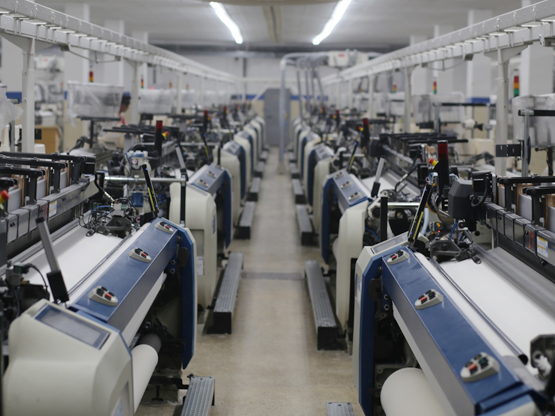
a) What Are Air Jet Looms?
Air Jet Looms are a type of loom used in textile weaving that uses high-pressure air to insert the weft yarn into the fabric. This process is faster than traditional shuttle looms, allowing for more consistent fabric quality, reduced defects, and higher production speeds.
b) Benefits of Air Jet Looms for Hotel Textiles
Air Jet Looms provide several advantages for textile manufacturers, especially when producing hotel textiles that must meet high standards of quality, durability, and comfort:
- Speed and Efficiency: The increased speed of Air Jet Looms allows manufacturers to produce textiles at a much higher rate than traditional looms, meeting the large-scale needs of the hospitality industry.
- Precision and Consistency: Air Jet Looms create fabrics with even tension, reducing defects like uneven threads, gaps, or inconsistencies in the final product. This is essential for creating textiles that meet the high standards required by the hospitality industry.
- Durability: Fabrics produced on Air Jet Looms are typically more durable, meaning they can withstand the frequent laundering and heavy use that hotel textiles are subjected to.
- Sustainability: Air Jet Looms are more efficient in terms of energy use, reducing waste and resource consumption in the production process, making them a more sustainable choice.
Acme Mills: A Leading Textile Exporter
When it comes to sourcing top-quality hotel textiles, Acme Mills is a name that stands out in the industry. As a leading textile exporter in Pakistan, Acme Mills specializes in providing premium textiles for the hospitality sector, offering a wide range of products such as high-quality bed linens, towels, and custom upholstery fabrics.
Acme Mills is renowned for its use of cutting-edge manufacturing technologies, including Air Jet Looms, which enable the company to produce textiles with superior consistency, durability, and quality. The company also prides itself on sustainability, offering eco-friendly textile options that align with modern environmental standards.
Whether you’re looking for bespoke fabric solutions or ready-made textiles, Acme Mills is an industry leader in producing textiles and hotel textile guide for managers that enhance the guest experience and stand the test of time.
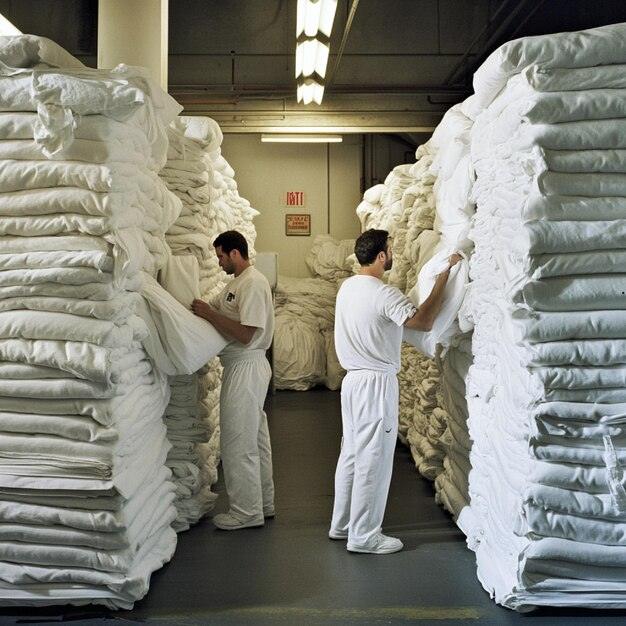
Conclusion
Hotel textiles are essential to providing guests with a comfortable and memorable experience. By exploring the hotel textile guide, the key quality standards to look for, and the advanced technologies used in textile production, hospitality managers can ensure they are making the best choices for their property.
From luxurious bed linens and plush towels to eco-friendly, high-performance fabrics, every decision counts. Leveraging innovations such as Air Jet Looms allows for high-quality, durable fabrics that maintain their appeal over time. For hospitality managers seeking superior textiles, partnering with reputable suppliers like Acme Mills will ensure that your property remains at the forefront of quality and guest satisfaction.

